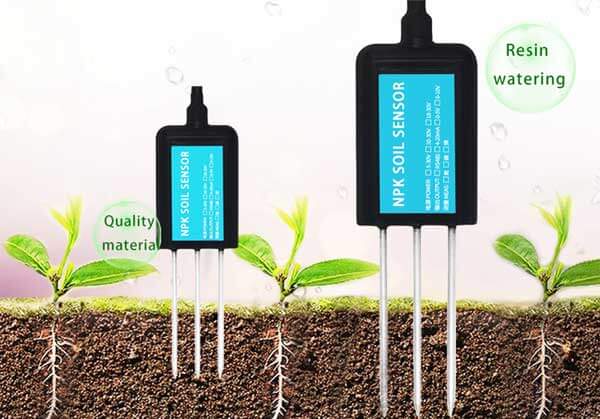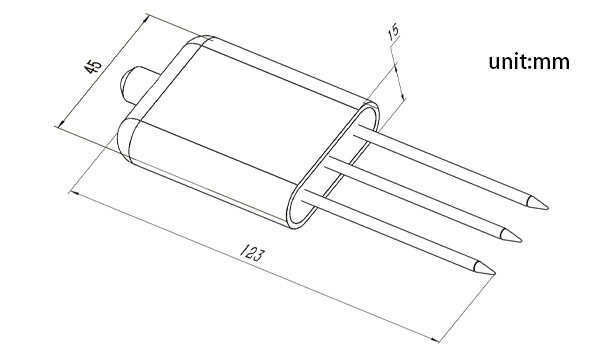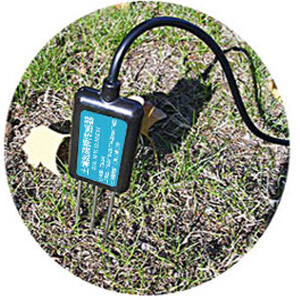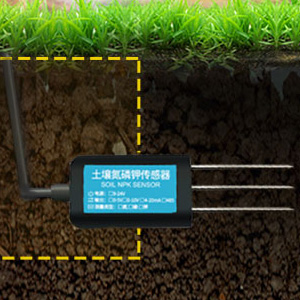Soil Moisture Sensor FAQ
Soil moisture is the source of the survival of plants. Soil moisture refers to the moisture content of the soil. The moisture content of the
The soil NPK sensor is suitable for detecting the content of nitrogen, phosphorus, and potassium in the soil, and judging the fertility of the soil by detecting the content of N, P, and K in the soil. The stainless steel probe of the soil npk sensor can be buried in the soil for a long time and is resistant to long-term electrolysis, salt, and alkali corrosion. The shell is vacuum potted and completely waterproof.

The soil npk sensor is suitable for detecting the content of nitrogen, phosphorus, and potassium in the soil, and judging the fertility of the soil. thereby facilitating the systematic evaluation of the soil condition. Can be buried in the soil for a long time, resistant to long-term electrolysis, corrosion resistance, vacuum potting, and completely waterproof. Soil npk sensors are widely used in soil nitrogen, phosphorus and potassium detection, precision agriculture, forestry, soil research, geological prospecting, plant cultivation and other fields.
1. Simple to use, few operation steps, fast measurement, no reagents, unlimited detection times.
2. High measurement accuracy, fast response speed, and good interchangeability.
3. The electrode is made of specially treated alloy material, which can withstand strong external impact and is not easy to damage.
4. Completely sealed, resistant to acid and alkali corrosion, and can be buried in soil for long-term dynamic testing.
5. The probe plug-in design ensures accurate measurement and reliable performance.
Power supply: 5-30VDC
Maximum power consumption: ≤0.15W
Operating temperature: -40~80℃
NPK parameters:
Range: 0-1999 mg/kg(mg/L)
Resolution: 1 mg/kg(mg/L)
Precision: ±2%FS
Response time: ≤1S
Protection grade: IP68
Probe material: 316 stainless steel
Sealing material: Black flame-retardant epoxy resin
Default cable length: 2 meters, cable length can be customized
Dimensions: 45*15*123mm
Output signal: RS485/4-20ma/0-5v/0-10v

How do soil NPK sensors work?
The soil NPK sensor is suitable for detecting the content of nitrogen, phosphorus and potassium in the soil, and judges the fertility of the soil by detecting the conductivity transformation caused by different nitrogen, phosphorus and potassium concentrations in the soil.

measurement location, avoid rocks, ensure that the steel needle does not touch hard objects, throw away the surface soil according to the required measurement depth, maintain the original tightness of the soil below, hold the sensor vertically and insert it into the soil. Do not shake left and right. It is recommended to measure multiple times for average value within a small range of a measuring point.

Dig a pit with a diameter> 20cm vertically, insert the sensor needle horizontally into the pit wall at a predetermined depth, and fill the pit tightly. After a period of stability, measurement and recording can be carried out for several days, months, or even longer.
1. All steel needles must be inserted into the soil during measurement.
2. Avoid strong sunlight directly shining on the sensor to cause excessive temperature. Pay attention to lightning protection in the field.
3. Do not bend the steel needle violently, pull the lead wire of the sensor forcefully, and do not hit or hit the sensor violently.
4. The sensor’s protection grade is IP68, so the whole sensor can be soaked in water.
5. Due to the presence of radiofrequency electromagnetic radiation in the air, it is not suitable to stay in the air for a long time with electricity.
Soil moisture is the source of the survival of plants. Soil moisture refers to the moisture content of the soil. The moisture content of the
Soil nutrients are the basis for plant growth. Just like human beings eat, they obtain various nutrients for the body’s growth and development through the
Soil moisture sensors are also known as soil moisture meters. It is mainly used for measuring soil volumetric water content, monitoring soil moisture, agricultural irrigation,
A greenhouse is a closed environment that provides optimal conditions for plant growth and promotes plant growth by controlling indoor and outdoor environments. A complete
What is smart farming? Smart farming is the application of Internet of Things technology to traditional agriculture, using sensors and software to control agricultural production
Whether it is farmland or a garden, the most important thing for crops to grow and bloom beautifully is soil. Knowing our soil conditions can
Agricultural irrigation mainly refers to irrigation operations carried out in agricultural farming areas. Agricultural irrigation methods can generally be divided into traditional surface irrigation, ordinary
what is a soil moisture sensor? The soil moisture sensor is composed of a stainless steel probe and a waterproof probe, which can be buried
Water is an important part of plant growth, and plants cannot survive without water. Nutrients are the basis for the vigorous growth of plants. The
What is soil sensor? Soil sensors are instruments used to monitor soil moisture conditions. They can be categorized into sensors that monitor moisture, conductivity, temperature,